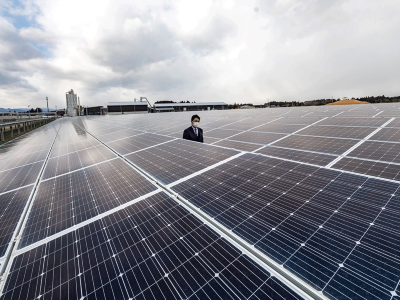The growing impacts of climate change mean that no nation can follow a high-carbon path to development. But the costs of a low-carbon transition cannot be put on the backs of the poor by keeping people in energy poverty or diverting funds needed for social expenditure. Fraught exchanges over climate equity at the United Nations climate talks in Bonn, Germany, last month show that historical tensions between high- and low-income countries about who should do how much to address climate change are coming to a head.
A summit for leaders of the G20 group of economic powers in New Delhi this September is a chance to find common ground to promote equitable and ambitious climate action.
Climate equity should be central. Responsibility for a solution should not fall to those who have contributed least to the problem and are least able to address it.
Common ground lies in seeing both potential opportunity and the reality of complex and costly transitions. Context matters to both: pathways to just energy transitions will differ between African countries, for example, depending on local potential for different types of renewable energy (such as Ethiopia’s hydropower capacity), existing energy mix and levels of energy access, and the cost of capital.
The decline in renewable-energy prices over the past decade opens the door to considering the benefits, not just the costs, of efforts to limit carbon. Under the right conditions, limits on carbon could be economically and developmentally advantageous. China has demonstrated this through its leadership in solar-panel manufacturing.
Yet transitioning to low-carbon energy systems will not be cheap or easy for poorer economies. For example, India is locked into using electricity subsidies as a form of welfare payment, has based the viability of its rail system on over-charging for coal freight, and depends on fossil-fuel taxes to fill fiscal coffers. The pace of transition required to limit warming to 1.5 °C above pre-industrial temperatures is unprecedented.
Perhaps most important is ensuring that emerging economies that already face a high cost of capital can access low-cost finance. The Intergovernmental Panel on Climate Change has found that 3–6 times more capital is needed for the global low-carbon transition than is currently allocated, but that number is 5–12 times higher for Africa and 7–14 times higher for southern Asia.
Given these realities, I suggest that G20 leaders consider framing a declaration on climate change and development around the following three components.
First, because context matters, low- and middle-income countries should assess their specific needs and requirements regarding mitigation, adaptation and loss and damage while accounting for their development priorities. This would indicate what specifically is to be financed while signalling serious intent to incorporate climate considerations into development. To reflect on-the-ground realities, such assessments should use local data, institutions, models and objectives.
Second, consistent with climate equity, industrialized countries must redouble their efforts to support shifts to low-emissions and climate-resilient development pathways. Funding for climate adaptation and to cover losses due to climate change must be grant-based, not loan-based, drawing on the idea of solidarity. Concrete, nation-specific plans should lead to greater confidence that financial support will be used to build mitigative and adaptive capacity.
The Paris Summit for a New Global Financing Pact, held last month, signalled renewed political interest in the climate-equity agenda, but it must be followed by actual delivery of finance. Rich countries must restore frayed credibility: they have failed to fulfil their 2009 promise of providing US$100 billion a year, and the actual amount of money needed is several times higher than that. Some pledges and funding offered by the G7group of the world’s biggest economies are limited to reducing use of fossil fuels, rather than having a more expansive vision.
Three climate policies that the G7 must adopt — for itself and the wider world
Third, the world’s poorest people need insurance against having their energy needs squeezed, which could occur under the rapid pace of decarbonization that is required. For example, a G20 declaration could enshrine an equity principle for fossil-fuel funding and regulation: the few fossil fuels that fall in the remaining global carbon budget should be used, where they contribute the most to human welfare: in poorer countries. The need to use this insurance will probably be proportional to the credibility of promises of support from rich countries. Such an agreement would help to correct current injustices, such as European nations using short-term energy-security concerns stemming from the Russia–Ukraine war to justify re-opening their own coal plants while withdrawing support for World Bank funding of fossil-fuel infrastructure in Africa. It could inform decisions, such as whether the World Bank finances fossil-fuel expansion in Nigeria. And it could speed up the phasing out of fossil fuels in the industrialized world.
The choice between development and a low-carbon future is not viable and is increasingly leading to the wrong questions. But achieving both is not trivial and will require both political will and determined implementation. National and concrete assessment of needs, credible delivery of transition support, and a guiding principle of using fossil fuels only where they make the greatest contributions to welfare offer the contours of a way forward.



 Net-zero plans exclude Africa
Net-zero plans exclude Africa
 Blanket bans on fossil-fuel funds will entrench poverty
Blanket bans on fossil-fuel funds will entrench poverty
 Blanket bans on fossil fuels hurt women and lower-income countries
Blanket bans on fossil fuels hurt women and lower-income countries
 Three climate policies that the G7 must adopt — for itself and the wider world
Three climate policies that the G7 must adopt — for itself and the wider world





![High carrier mobility along the [111] orientation in Cu2O photoelectrodes](https://media.nature.com/w140h79/springer-static/image/art%3A10.1038%2Fs41586-024-07273-8/MediaObjects/41586_2024_7273_Fig1_HTML.png)

